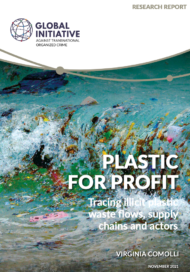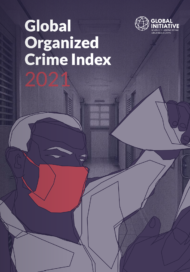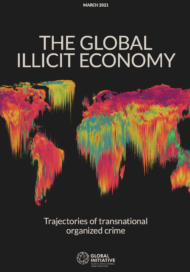Event Details
Posted on 31 Oct 2021
On 31 October, world leaders convened in Glasgow as the United Kingdom hosts the 26th UN Climate Change Conference of the Parties (COP26). To achieve a Net-Zero future, it is essential – among other interventions – to manage and control the indiscriminate use of plastic and the way it is disposed of once it becomes waste. Confronting the trade in plastic waste is also an issue of climate justice, as the by-products aggravate health and environmental harms in lower-income countries and among communities that lack the political leverage to reject this waste.
Owing to its durability and affordability, plastic has become the material of choice for an endless list of purposes. This has led to its overuse and the subsequent, very serious, questions around how plastic is disposed of. It is a bleak statistic that less than 20% of plastic is recycled globally. As for the remainder, the solution for the key waste-producing countries of Europe and North America, which are the major culprits and which have inadequate recycling capacity, has long been to ship waste abroad, especially to developing countries in Asia and Africa.
It is a ‘solution’ that is unsustainable, for we are witnessing a convergence of factors that would strongly suggest that current rates of plastic consumption are only likely to worsen over the coming decades. Among others, a strong economic argument hinders change. Producing virgin plastic is often more affordable than manufacturing with its recycled equivalent, a reality that is very much fuelled by the shale gas boom in the US and the way it is encouraging fracking internationally. Therefore, the global waste plastics recycling market is going to struggle to be competitive in the face of cheaper and often better-quality raw plastic.
The Basel Convention, and other related legislation, is designed to safeguard receiving countries that do not have sophisticated plastic processing facilities from becoming dumping grounds for foreign waste. But despite the Convention, the economic imperative of the highly lucrative recycled plastics market (expected to reach US$50.36 billion by 2022) has attracted the attention of organized criminals and legitimate businesses that engage in fraudulent practices to circumvent the Convention and associated legislation. Misdeclaration and concealment of hazardous and mixed waste, money laundering, financial crime and corruption are among the crimes committed in relation to plastic waste. The criminalized supply chain for plastic waste often involves complex networks of brokers, recycling companies, logistics and shipping entities, as well corrupt officials (often at ports) who arrange the shipping of hazardous and mixed waste from countries such as the United States, the UK or The Netherlands to Malaysia, the Philippines and other countries predominantly in the Global South. In recipient countries, consignments are illegally disposed of in the absence of suitable processing facilities.
But the problem goes beyond just white-collar crime. Firstly, there is evidence in the illicit plastic waste economy of convergence with other criminal activities carried out by polycriminal groups in places such as Turkey and the UK, for instance, which also deal in drugs and prostitution. In some cases, waste-recycling companies have been accused of involvement in human trafficking and modern slavery as a way of sourcing cheap labour.
And arguably even more concerning is the long-term impact of inappropriate disposal practices on the environment and the health of the local communities who bear the brunt of the consequences. The most acute effects are borne by those living in vulnerable regions of Asia and Africa, the main recipients of often hazardous foreign waste, who have to contend on a daily basis with the pollution and contamination resulting from it. The health and environmental harm caused by the illegal dumping and burning of plastic waste in countries such as Indonesia or Malaysia, for example, is enormous. Once released into the environment, plastics, and the fumes generated through their incineration, pollute soil, water and air, poison food production and are the cause of a myriad of severe health conditions.
As discussions around ‘ecocide’ – and its possible inclusion among the crimes prosecuted by the International Criminal Court – are becoming more prominent, the need to draw attention to the detrimental impact of the illegal transnational waste trade could not be more timely.
Given the upward trajectory of illegality in the plastic waste trade, the exponential growth in plastic production and likely long-term reliance on raw (as opposed to recycled) plastic, and the continual proliferation of illicit trade routes, a multi-pronged approach is needed to encourage a rethink of the current waste disposal model. To be effective, all actors across jurisdictions and sectors ought to be included, from industry (i.e. plastics producers, recycling companies, brokering and logistics supply) to governments and regulators, from law enforcement to NGOs. Communities on the ground who are most affected must also be included as agents of change. This, in turn, would help emerging and developing economies achieve environmental justice – a goal that currently looks out of reach for many.
COP26 embodies the need for a joint global effort to mitigate the climate crisis and will encourage us to set goals that meet the challenges we face today. Policy across sectors should then be guided by our responsibility to work towards these goals. The ultimate objective should be to replace plastic with better products and dramatically ramp up the ability to affordably and safely recycle plastic that exists. But in the meantime, there is a critical need now to address the waste generated by plastic by tackling those actors that are involved illicitly in exploiting the trade in waste plastic, and to fundamentally revise the factors that are enabling those actors to exploit this industry.




